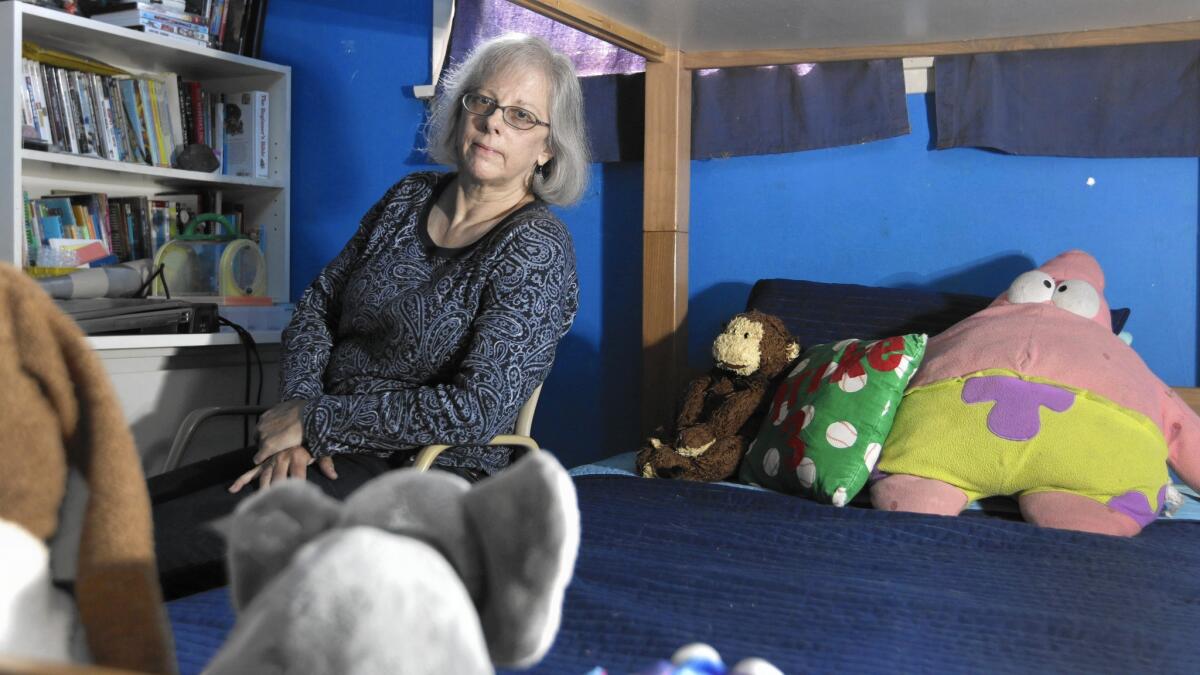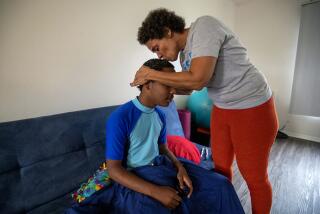Raising a foster child damaged by alcohol

- Share via
In three weeks, Kathryn White’s son Chris will turn 18. There will be a little birthday celebration — and a hint of desperation.
The milestone officially makes Chris an adult, and that will make it hard for his parents to find the shelter and counseling he needs.
Kathryn and her husband, Shaun, took in Chris and his younger brother as foster children when the boys were 5 and 3, and adopted them a few years later.
Their mother was an addict, and both children were born with fetal alcohol syndrome — which damages the brain in utero, causing stunted growth, mental deficits and behavior problems.
White read up on it but wasn’t too worried: “It seemed like if they had proper schools and proper support, this was something they could overcome.”
But the deck had been stacked against Chris, who would eventually be diagnosed with bipolar disorder.
Living with the Whites, he attended a school for children with disabilities and took medication to manage his illnesses. “Things were great for two years,” White recalled. “Then puberty hit.”
Typical adolescent storms were, for Chris, raging tornadoes.
“There are times you look at him and see your normal teenager,” White said. “He wants to listen to music, have a girlfriend, dress the way other teenagers dress.”
But he still believes in Santa Claus, she said. When he needs comforting, he sucks his thumb. When he gets angry, he might throw a chair or punch someone.
Chris has blackened his father’s eyes, tried to hit his mother and assaulted his brother. He’s seen 17 different therapists, been on several medication combinations and spent four years in three separate residential treatment facilities.
When he turns 18, his current live-in program ends and the options shrink.
He’s not independent enough for a transitional-living apartment. He’s not disabled enough for the state to care for him. He’s not stable enough to live at home with his family.
“There’s no place for him to go,” White said, “where we can all be safe.”
::
For a mother, White knows, that sounds harsh. She’s become accustomed to being judged.
Her church shut down its youth group rather than let her boys attend; the leader said Chris was scaring the other kids.
“It really hurts,” White said, “when somebody doesn’t want your kid around.”
And it stings when his misbehavior is blamed on bad parenting.
“They didn’t know about fetal alcohol syndrome,” she said. “They just thought of us as lazy parents with children who are difficult to control.”
That’s why she emailed me about Chris on Monday morning: She wants disabled children like her son to be on everyone’s radar screen.
White belongs to support groups and attends parenting classes. But outside those circles, few people understand the challenges that children damaged by alcohol face.
“People have no idea the range of physical and behavioral problems these children have,” said social worker Janis Reid, the adoptive mother of a child with fetal alcohol syndrome.
Reid teaches parents and counselors to deal with its disabilities: mental retardation, deficits in language and reasoning, problems managing anger, dangerous impulsiveness.
Because there is such a broad range of symptoms, the damage isn’t always obvious or easy to label. And often it’s compounded by the trauma of dysfunctional families or the sometimes treacherous life in foster care.
“A lot of our professional systems don’t know what to do with these kids,” Reid said. “People say: ‘They should know better. What’s wrong with them?’ They fall through the cracks in school, tend not to qualify for services and don’t get a lot of their needs met.”
That’s become the storyline of Chris’ life.
“We have done everything in our power to help him for the last 14 years, and now it may all be for nothing,” White said. “We’re in crisis mode with him — and he’s just one person out of hundreds and thousands of people with fetal alcohol syndrome.”
::
I could hear the anguish — and a sense of failure — in White’s voice.
She and her husband raised a son and daughter before adopting Chris and his brother. She’s a preschool teacher, and she tried to create a safe space in her home for the deeply troubled children.
They went, as a family, to the mountains, the zoo, the beach, museums. “Chris still loves the mountains,” White said. And she loves that he can see mountains from the window of his cottage at the treatment center.
Her youngest boy still offers the prospect of success: He attends the high school in their Downey neighborhood, where he requires some special education help. But he has friends, runs track, looks forward to graduation and dreams of working on a construction site.
He misses his brother, White said. When they’re together on weekly visits, “they start quoting movie dialogue to each other and rolling around on the floor.”
She is not giving up on Chris — who doctors say has the mind of a 9-year-old. “It looks terrible on paper … but there are things about him that are wonderful and sweet,” she said. She imagines him “in a sheltered workshop, with a simple job to do, like sorting materials or folding and organizing things.”
But she has given up on her rescue fantasies:
“We tried to give them more of a normal childhood than they would have had. We knew there’d be challenges,” she said.
“Everybody wants to be that family where you have the kid who people thought would never be anything and they become a doctor. I would just be happy if they were happy and functional and somewhat self-supporting.”
Right now, even that seems like a tall order.
Twitter: @SandyBanksLAT
More to Read
Sign up for Essential California
The most important California stories and recommendations in your inbox every morning.
You may occasionally receive promotional content from the Los Angeles Times.














